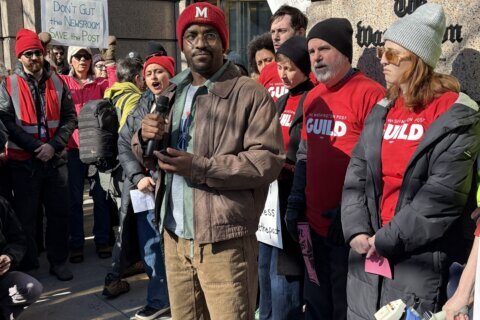Workers in D.C. have gained a new resource geared toward making it easier to report employer mistreatment.
D.C. Attorney General Karl Racine said he has formed a Labor Advisory Council to include “a diverse set of union representatives and leaders” providing outreach and education to workers. He said his office needs this partnership with organizations and advocates to address rampant worker mistreatment.
“We know we can’t be everywhere. And we obviously cannot take on the many individual cases that need to be brought. That’s why we rely on people in the community to fill the gaps,” he said.
The advisory council will help laborers and investigates the concerns of workers such as Blana Jimenez.
Jimenez is a single mother of two who worked in construction as a drywall finisher. At her last job, she said, an employer “delayed my check for three weeks, holding $1,155 that I counted on to pay my bills.”
She told the attorney general, and a group of labor union representatives, that she believes wage theft from immigrant workers is underreported.
“Getting paid late in cash, not getting paid for overtime or not getting paid at all, is too often the norm in the construction industry,” Jimenez said.
Avoiding wage laws
As of July 1, under the District’s wage and hour laws, all D.C. employers, with the exception of the federal government, must pay employees at least $15.20 per hour, 20 cents higher than the year before.
Ron Meischker, the director of industry, labor and compliance at the Atlantic States Regional Council of Carpenters Organization, said wage theft takes many shapes across the construction industry.
“Unions were built off the idea of fair wages being paid and benefits being provided in a safe working environment. That fight continues today, as we see construction industry tax fraud, wage theft and worker misclassification,” he said.
According to an OAG report, District construction companies that misclassify workers unlawfully avoid at least 16.7% of labor costs. That number can exceed more than 40% if the company engages in other forms of wage theft.
On top of this, a report from the Economic Policy Institute said low-wage workers were particularly hard hit during the COVID-19 pandemic. Less than 75% of low-wage workers were still working in 2020, while more than 90% of high-wage workers remained employed.
The OAG published resources, which are available in English and Spanish, to help workers protect themselves from unscrupulous employers. They include comprehensive information about the District’s wage and hour laws, and where workers can get help if their rights are being violated.
The office also provides free wage and hour logbooks to help workers keep track of their wages and ensure they actually receive their pay. Workers can print the logbook here.








